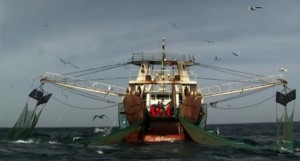 An Ocean Without Fish
An Ocean Without Fish
Imagine an ocean without fish. Imagine your meals without seafood. Imagine the global consequences. This is the future if we do not stop, think and act.
“The End of the Line” was the first major documentary film to reveal the devastating effects of overfishing on our oceans and to show the direct effects of our global love affair with fish as food.
It examines the imminent extinction of bluefin tuna, brought on by the growing western demand for sushi, the impact this has on marine life, such as the huge overpopulation of jellyfish and the profound implications of a future with no fish which would result in mass starvation for many across the globe.
Filmed over a two year period it documented investigative reporter Charles Clover as he confronted politicians and celebrity restaurant owners who expressed little interest in the damage they are doing to the oceans.
One of his allies in his investigations is the whistle-blower Robert Mielgo, a former tuna farmer intent on exposing those involved in destroying the world’s magnificent bluefin tuna population.
The film travels right across the globe, from the Straits of Gibraltar to the coasts of Senegal and Alaska to the Tokyo fish market. It features top scientists, indigenous fishermen and fisheries enforcement officials. The End of the Line is a wake-up call to the world.
The End of Seafood by 2048
Scientists predict that if we continue fishing as we are now, we will see the end of most seafood by 2048
The End of the Line chronicles how high-tech fishing vessels leave no escape routes for fish populations, how farmed fish as a solution is a myth and how the demand for cod off the coast of Newfoundland in the early 1990s led to the decimation of the most abundant cod population in the world.
The responsibility lies with consumers who innocently buy endangered fish, politicians who ignore the advice and pleas of scientists, fishermen who break quotas and fish illegally, and a global fishing industry that is slow to react to an impending disaster.
The End of the Line shows that there are solutions that are simple and doable, but political will and activism are crucial if this is to be solved.
We need to protect large areas of the ocean through a network of marine reserves which are off limits to fishing, to educate consumers that they have a choice by purchasing fish from independently certified sustainable fisheries and to control fishing by reducing the number of fishing boats across the world
Global Campaign
The End of the Line premiered at the Sundance Film Festival in 2009 and was used to launch a global campaign for citizens to demand better marine policies.
Charles Clover, the book’s author said, “We must stop thinking of our oceans as a food factory and realize that they thrive as a huge and complex marine environment.
We must act now to protect the sea from rampant overfishing so that there will be fish in the sea for our grandchildren and great-grandchildren.”
“Overfishing is the great environmental disaster that people haven’t heard about,” said producer George Duffield.
“A recent global conference about bluefin tuna stocks saw almost no media coverage in the U.S. We hope this film really sounds the alarm. We can fix this problem starting right now.”
“Reading the book The End of the Line changed my life and what I eat. I hope the film will do the same for others,” said producer Claire Lewis.
How the film was financed
The End of the Line is a leading example of the new wave of documentary. It is an independent film – made outside the established broadcasting structure.
It is a campaigning film which aims to change the world by engaging large public audiences in a political issue. And it is a project which is integrated with the work of NGOs and progressive companies to achieve this change.
The film’s financing is an example of the new model of funding: with cornerstone funding from the UK’s Channel 4 BRITDOC Foundation, the vast bulk of the finance came from not-for-profit foundations in the UK and the USA.
In the UK the cinema release of the film was supported financially by Waitrose – a major UK retailer.
The film has received financial support from: The Waitt Family Foundation, Marviva, The Oak Foundation, Channel 4 BRITDOC Foundation, WWF, The Weston Foundation, The Clore Foundation, The Marine Conservation Society, AD Charitable Trust, GD Charitable Trust, Waterloo Foundation and Oceana.


